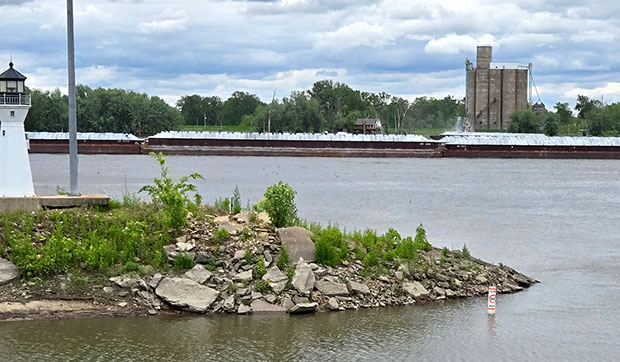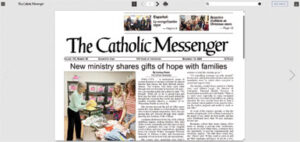
The Mississippi River is seen from the marina in Burlington.
By Barb Arland-Fye
Editor
Our nation gave birth to the landmark Clean Water Act 53 years ago in response to growing concerns about water pollution. This law helps protect and revitalize waterways through pollution control programs, such as setting wastewater standards for industry and developing recommendations for water quality criteria for pollutants in surface waters (U.S. Environmental Protection Agency).
Now the U.S. House of Representatives is considering a bill that would “limit” the scope of the Clean Water Act, in essence, dismantling it. The Promoting Efficient Review for Modern Infrastructure Today Act (“PERMIT Act,” H.R. 3898) “strives to once again find balance within the regulatory process originally envisioned by the CWA by providing a comprehensive package of commonsense reforms,” the bill states.
The reforms would redefine navigable waters to “exclude waste treatment systems, ephemeral features that flow only in direct response to precipitation, prior converted cropland, groundwater or any other features determined to be excluded by the U.S. Army Corps of Engineers.” The bill’s authors say it would “support energy producers, the agriculture sector, builders, and utilities.”
The so-called reforms come at the expense of people and the environment they inhabit, a point that the Environmental Law & Policy Center (ELPC) makes in its news release objecting to the proposed legislation.
The bill would “PERMIT more pollution to be discharged into Iowa’s waterways, threaten the health of Iowans, and remove protections from wetlands and small streams that filter out pollution and reduce flooding,” said Matt Ohloff, policy advocate for ELPC’s Des Moines office. “We depend on those waterways for drinking water, for swimming and boating, for businesses that need clean water, and to support thriving fish and wildlife populations.”
As stewards of God’s creation, we must engage in proactive, self-disciplined and creative initiatives to establish positive co-existence between industry and the environment. We must, as Pope Francis implored us in “Laudato Si’” (On Care for our Common Home), establish new habits and grow in solidarity, responsibility and compassionate care toward others.
We begin with this framework: Pray. Learn. Act. This is our call — as individuals and in community — to “engage in spiritual reflection, acquire knowledge about important issues, and then take tangible steps to enact positive change,” as Deacon Kent Ferris said during a Pilgrimage of Hope for Creation Sept. 6 in Davenport.
Advocacy is vital. A week before the pilgrimage, Deacon Ferris, diocesan director of Social Action and Catholic Charities, accompanied Ohloff and others to U.S. Representative Mariannette Miller-Meeks’ Davenport office, to express opposition to the PERMIT Act. Iowa Faith & Climate Network and ELPC arranged the visit.
“My concern with the bill has to do with how reducing waterway protections under the Clean Water Act has the potential of harming Iowans in ways that are hard to grasp and also how those living in poverty would quite likely be most vulnerable to compromised water,” Deacon Ferris said. “We must be prepared to respond to the cry of the poor and the Earth, as Pope Francis so prophetically taught.” The advocates were still waiting for a response at press time.
The U.S. House may consider the legislation this week, but it would not be a done deal without consideration and approval in the U.S. Senate. We still have time to Pray. Learn. Act. Here are some suggestions:
- Pray, that Congress prioritizes the well-being of people and the planet.
- Reflect on the Seven Themes of Catholic Social Teaching on the U.S. Conference of Catholic Bishops’ website (https://tinyurl.com/ywjeaa3z).
- Learn about the proposed legislation at congress.gov (https://tinyurl.com/6wxtszk9) and the ELPC (https://tinyurl.com/4zd4sh7w).
- Read a summary of the Clean Water Act on the U.S. Environmental Protection Agency website (https://tinyurl.com/3knjd5se).
- Advocate. Contact U.S. Rep. Miller-Meeks (millermeeks.house.gov) or the House member representing your district (congress.gov) asking them to oppose the PERMIT Act.
- Connect with the Iowa Catholic Conference
(iowacatholicconference.org) to maintain awareness of state legislation addressing water quality.
Pope Benedict XVI, nicknamed “the green pope,” called us to “exercise responsible stewardship of creation, in order to protect it, to enjoy its fruits, and to cultivate it, finding the resources necessary for everyone to live with dignity” (General Audience, Aug. 26, 2009).
We cannot “permit” Congress to throw the baby out with the bathwater.
Barb Arland-Fye
arland-fye@davenportdiocese.org









